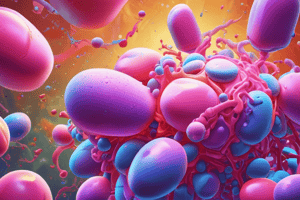Podcast
Questions and Answers
What is the impact of a drug with a short half-life on dosing frequency?
What is the impact of a drug with a short half-life on dosing frequency?
- Requires infrequent dosing
- Requires a high dose each time
- Requires frequent dosing (correct)
- Requires no dosing
Which half-life duration indicates that a drug can be administered less frequently?
Which half-life duration indicates that a drug can be administered less frequently?
- 21–24 hours (correct)
- 10–15 hours
- 1–2 hours
- 2–4 hours
If a drug has a half-life of 3 hours, what can be concluded about its dosing schedule?
If a drug has a half-life of 3 hours, what can be concluded about its dosing schedule?
- It should be taken once a day
- It should be taken every several hours (correct)
- It can be taken once every two days
- It requires continuous infusion
What is the significance of knowing a drug's half-life?
What is the significance of knowing a drug's half-life?
A patient is prescribed a medication with a half-life of 22 hours. What dosing recommendation would be appropriate?
A patient is prescribed a medication with a half-life of 22 hours. What dosing recommendation would be appropriate?
What is the primary route of excretion for most drugs and drug metabolites?
What is the primary route of excretion for most drugs and drug metabolites?
Which of the following statements about renal excretion is true?
Which of the following statements about renal excretion is true?
Which drugs are excreted unchanged by the kidney?
Which drugs are excreted unchanged by the kidney?
What role does the liver play in drug excretion?
What role does the liver play in drug excretion?
Which of the following best describes renal excretion?
Which of the following best describes renal excretion?
Flashcards are hidden until you start studying
Study Notes
Renal Excretion
- The kidneys are the primary route of excretion for most drugs and their metabolites.
- Drugs with short half-lives (2-4 hours) require frequent administration.
- Drugs with long half-lives (21-24 hours) require less frequent administration.
- The half-life of a drug determines the frequency of dosing.
Drug Metabolism
- The liver is the primary site of drug metabolism.
- Some drugs are excreted unchanged by the kidneys without liver involvement.
- Liver disease can affect drug metabolism.
- The kidneys, lungs, plasma, and intestinal mucosa also contribute to drug metabolism.
- Enzyme inhibition or induction can affect drug metabolism.
- Only unbound drugs in the blood can diffuse across cell membranes into tissues.
Drug Receptors
- There are different types of drug receptors:
- Alpha and beta adreno-receptors.
- Intracellular receptors (found in the cytoplasm or cell): binding of the drug to the receptor results in protein production (e.g., steroid receptors).
Studying That Suits You
Use AI to generate personalized quizzes and flashcards to suit your learning preferences.



